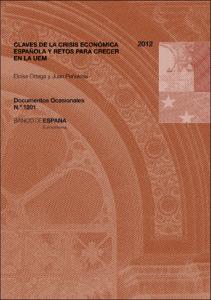Claves de la crisis económica española y retos para crecer en la UEM
Autor
Fecha de publicación
26-ene-2012
Descripción física
38 p. : gráf.
Resumen
La crisis económica que ha afectado a los países industrializados en los últimos años ha sido singular por su intensidad, complejidad y por las dificultades para su superación. El objetivo de este trabajo es analizar los factores que han determinado que la crisis haya adquirido en España una profundidad y duración superiores a las de episodios anteriores y que la salida de la recesión esté encontrando obstáculos significativos. La pertenencia de España a la UEM es un aspecto crucial a considerar, pues contribuye tanto a explicar la acumulación de desequilibrios en la expansión como a condicionar la naturaleza del ajuste en la crisis, dado que la batería de instrumentos de política económica se ha reducido significativamente. Los desequilibrios macroeconómicos y financieros acumulados en la etapa de alto crecimiento (boom inmobiliario, exceso de endeudamiento y pérdida de competitividad), todos ellos estrechamente interrelacionados, representaban factores de vulnerabilidad, pero, incluso los fundamentos aparentemente más sólidos en otros ámbitos, como en el caso de la situación presupuestaria y del mercado laboral, han mostrado sus debilidades en la crisis. La experiencia a lo largo de los últimos cuatro años permite extraer algunas lecciones en relación con el sector exterior, el mercado inmobiliario, la política fiscal y el mercado de trabajo, que alertan, en particular, sobre la necesidad de evitar la complacencia en la gestión de la política económica en las etapas de auge y sobre la urgencia de adaptar en España la estructura de los mercados de bienes y factores y el comportamiento de los agentes a los requisitos que impone la pertenencia a una unión monetaria
The economic crisis affecting the industrialised countries in recent years has been singular given its intensity, complexity and the difficulties in overcoming it. The aim of this paper is to analyse the determinants behind the crisis that have made it deeper and longer in Spain than in previous instances, and which have meant that there are significant obstacles to emerging from recession. Spanish EMU membership is a crucial aspect for consideration, as it contributes both to explaining the build-up of imbalances in the expansion and to conditioning the nature of the adjustment in the crisis, given that the range of economic policy instruments is significantly narrower in EMU. The macroeconomic and financial imbalances accumulated in the high-growth phase (the real estate boom, excess debt and the loss in competitiveness), which are all closely interlinked, were factors of vulnerability. But even apparently sounder fundamentals on other fronts, such as the budgetary and labour market situation, saw their weaknesses exposed in the crisis. The experience over the past four years allows some lessons to be drawn on the external sector, the real estate market, fiscal policy and the labour market. These lessons point in particular to the need to avoid complacency in economic policy management in boom periods and to the urgency of adapting the structure of goods and factor markets and the behaviour of economic agents in Spain to the requirements imposed by membership of a monetary union
The economic crisis affecting the industrialised countries in recent years has been singular given its intensity, complexity and the difficulties in overcoming it. The aim of this paper is to analyse the determinants behind the crisis that have made it deeper and longer in Spain than in previous instances, and which have meant that there are significant obstacles to emerging from recession. Spanish EMU membership is a crucial aspect for consideration, as it contributes both to explaining the build-up of imbalances in the expansion and to conditioning the nature of the adjustment in the crisis, given that the range of economic policy instruments is significantly narrower in EMU. The macroeconomic and financial imbalances accumulated in the high-growth phase (the real estate boom, excess debt and the loss in competitiveness), which are all closely interlinked, were factors of vulnerability. But even apparently sounder fundamentals on other fronts, such as the budgetary and labour market situation, saw their weaknesses exposed in the crisis. The experience over the past four years allows some lessons to be drawn on the external sector, the real estate market, fiscal policy and the labour market. These lessons point in particular to the need to avoid complacency in economic policy management in boom periods and to the urgency of adapting the structure of goods and factor markets and the behaviour of economic agents in Spain to the requirements imposed by membership of a monetary union
Notas
Incluye bibliografía
Publicado en
Documentos Ocasionales / Banco de España, 1201
Otras versiones
Materias
Economía española; UEM; Crisis económica; Competitividad; Mercado inmobiliario; Endeudamiento; Spanish economy; EMU; Economic crisis; Competitiveness; Real estate market; Debt; Evolución y desarrollo económicos; España; Zona euro
Aparece en las colecciones:












